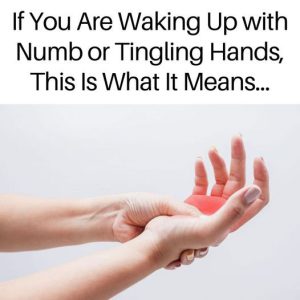Experiencing numbness and tingling in your hands can be alarming—especially when it happens often. Whether it feels like a mild tingling, pins and needles, or a complete loss of sensation, it can disrupt your day and leave you searching for answers. Fortunately, most causes are minor and manageable once you understand what’s behind them. Let’s explore the possible reasons your hands might be going numb and what you can do about it.

Waking up to find your hands asleep can be confusing and even a bit scary. That sudden feeling of pins and needles might make you wonder if something serious is happening. However, according to the Mayo Clinic, numbness on its own usually isn’t a sign of something dangerous like a stroke or tumor. In many cases, it’s nothing more than a temporary irritation or a sign of a manageable condition.
One of the most common causes of hand numbness is your sleep position. If you lie on your arm or hand while sleeping, it can compress nerves and restrict blood flow. This leads to that classic “tingling” feeling many people describe. The good news? It typically fades quickly after you shift your position. You don’t need to jump out of bed in a panic—just gently adjust your posture, and the sensation will likely subside within minutes.
Another frequent culprit is repetitive motion. Daily activities such as typing, writing, or using hand tools can put a strain on your hands and wrists over time. These movements can lead to nerve compression. A well-known example is carpal tunnel syndrome, where the median nerve in your wrist becomes compressed, resulting in numbness, tingling, and sometimes pain. Healthline warns that if left untreated, it can cause lasting nerve damage, and in some cases, surgery might be necessary to relieve pressure. To help avoid this, take regular breaks, stretch your wrists, and use ergonomic devices designed to reduce strain.
Vitamin deficiencies—especially vitamin B12—can also lead to numbness and tingling in both the hands and feet. B12 is essential for healthy nerve function, and when your body doesn’t get enough, it can begin to impact nerve signaling. People who follow vegetarian or vegan diets or those with absorption disorders such as Crohn’s disease are at higher risk. Fortunately, you can address this with dietary changes. Including B12-rich foods like eggs, dairy, fish, or fortified cereals can help. In some cases, supplements may also be beneficial.
Electrolyte imbalances are another reason for strange sensations in your hands. Your body needs the right levels of minerals such as calcium, potassium, and sodium to ensure proper nerve function. When these levels drop—often due to dehydration, certain medications, or medical conditions—nerve signaling can go awry. The result? Numbness or tingling. To maintain balance, drink plenty of fluids, eat a nutrient-dense diet, and consult a healthcare provider if symptoms persist.
People with diabetes should also be aware of peripheral neuropathy, a type of nerve damage caused by prolonged high blood sugar levels. This condition affects about half of individuals with diabetes and can lead to numbness, tingling, or even a burning sensation in the hands and feet. Managing blood sugar effectively is essential for both preventing and treating this complication.
Problems in the neck or spine can also be to blame. Herniated discs or cervical spondylosis—essentially wear and tear of the spine—can compress nerves in the neck. When that happens, tingling or numbness may radiate into your hands. If you’re experiencing neck pain or stiffness along with hand symptoms, these spinal issues could be the root cause. Treatment may include physical therapy, posture correction, or, in more severe cases, surgical intervention.
Autoimmune diseases like multiple sclerosis or rheumatoid arthritis may also cause hand numbness. These conditions often involve inflammation or damage to the nerves and may be accompanied by symptoms like joint pain, muscle weakness, or fatigue. Working with a specialist and following a treatment plan tailored to your condition can help manage symptoms and improve your quality of life.
In some instances, poor circulation might be to blame—especially if your hands become cold, pale, or painful in addition to being numb. Raynaud’s phenomenon is one such condition that causes blood vessels in the fingers and toes to narrow in response to cold or stress. Healthline notes that this reduced blood flow can make your hands feel numb and look discolored. Other circulation issues, such as blocked arteries, may also reduce blood flow to the hands. Staying warm, using hand warmers, and engaging in light exercise can help keep blood moving.
Nerve compression from benign growths like ganglion cysts can also cause symptoms. These fluid-filled lumps often form near joints or tendons in the wrist or hand and may press on nearby nerves, resulting in tingling or limited movement. Depending on the severity, a doctor may recommend draining the cyst or removing it surgically to relieve pressure.
Certain infections can directly affect the nerves and cause tingling in the hands. Shingles, which is caused by the reactivation of the chickenpox virus, can lead to nerve inflammation and a painful rash. Lyme disease, transmitted through tick bites, can also cause neurological symptoms like numbness or joint pain. Both conditions typically require antiviral or antibiotic treatment, so it’s important to seek medical attention if you suspect an infection.
Ultimately, numbness or tingling in your hands may be linked to something as simple as how you sleep or as complex as a chronic health condition. Occasional episodes are often harmless, but persistent or severe symptoms should not be ignored. Paying attention to your daily habits, nutritional intake, and overall health can help you pinpoint the cause and find the right solution.
So next time your hands start tingling or go numb, think about your lifestyle, posture, or any underlying health issues. Don’t ignore the signals your body is sending—understanding the cause is the first step toward feeling better and maintaining your overall well-being.





